Section A 2
Section A-2
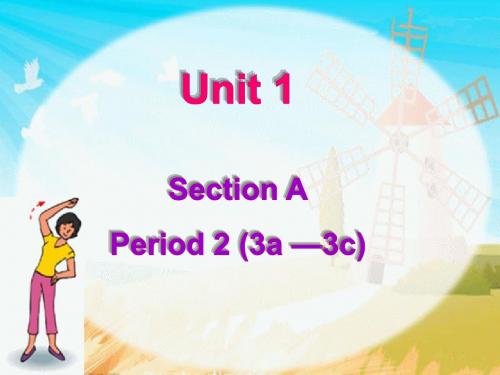
注意: 感官动词 see, watch, observe, notice, hear, look at, listen to, smell, taste, feel +doing 表示 动作的连续性、进行性 感官动词 see, watch, observe, notice, hear, look at, listen to, smell, taste, feel + do 表示动 作的完整性、真实性 I saw him work in the garden yesterday. 昨天我看见他在花园里干活了。 (强调"我看见了"这个事实)
You shouldn't ___________. exercise
What’s the matter? fever I have a _________. drink lots of water and go You should________________________. to bed go out and exercise You shouldn't_____________________.
when常常用来引导时间状语从句,当放在 过去进行时构成的主句之后时,表示主句 动作发生的过程中,另一个意想不到的动 作发生了。 I was thinking of this when I heard my name called. 我正想着这件事时,突然听到有人叫我 的名字。 We were playing outside when it began to rain. 我们正在外边玩,这时下起雨来了。
What’s the matter? I have a _____________. sore throat You should _________________________, drink some hot tea with honey or __________________. go to see the doctor You shouldn't ___________________________ eat dry food such as cookies or _______________. speak too loudly
新人教版八年级英语上册 Unit3 Section A 2a-2c 优质课件

5.特得比凯有意思。
Ted is _f_u_n_n__ie_r_(funny) than Kay.
6. 刘昂比我胖。
Liu Ang is _f_a_t_t_e_r_(fat) than me.
7.我比我的哥哥外向。
I am m__o__r_e_o(ouuttggoiinngg) than my brother.
2. …we look similar, but we’re very different.
look similar 看上去相似
look the same 看上去一样
look like…
看上去像……
look alike
看上去相像
3. Both Tom and Sam can play the drums, but Sam plays them better than Tom. 1) both“两个、两者都……”, 在句中 可作代词、形容词、副词、连词。 作副词时常放在be动词之后, 实义 动词之前。
e.g. Both (of) his parents are doctors. (作代词或形容词) =His parents are both doctors. (作副词) They both went camping in the holiday. (作副词)
Both English and math are very important. (both …and…短语常连接两个并列的成分, 可连接名词、动词、形容词和代词等) 注: both指两者都, all指三者或三者以上都。
不规则变化:
合二为一共三对,
bad / badly/ill – worse
坏、病、两多并两好
many / much – more一分为二有两个,
人教版英语九年级全册Unit1__SectionA(2a-2c)精品导学案
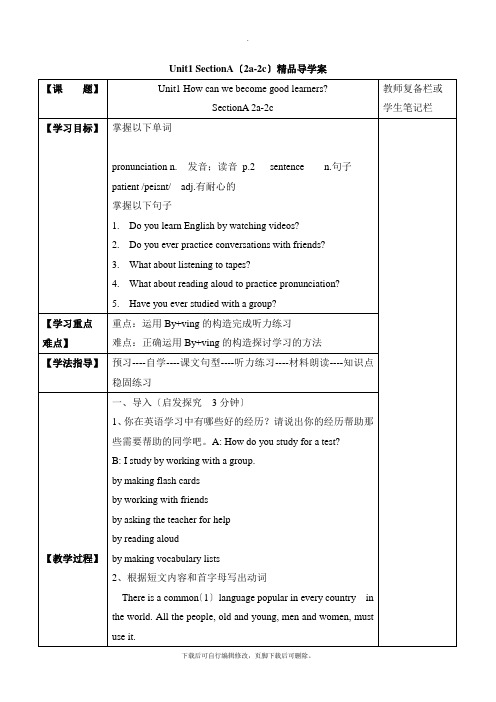
(2).对对方的帮助或要求表示委婉谢绝时,一般用:
◆ I don’t think so我认为不是这样◆Sorry, I can’t对不起,我不能◆I’d love to, but…◆ I’m afraid我愿意,但恐怕……
① –What about _______(listen) to some English songs? -- It’s great .
byasking the teacher for help
by reading aloud
by making vocabulary lists
2、根据短文内容和首字母写出动词
There is acommon〔1〕language popular in every country in the world. All the people, old and young, men and women, must use it.
【口诀】:分开是一段,合起是某时;分开s是倍次,合起s是有时
Mr. Green went to Sanya _____________(几次) last summer.
( ) I hope to visit the USA _____ in the future.
A. sometimes B. some times C. sometime D. some time
② Why not ___ your teacher for help when you can’t finish _____ it by yourself?
A. ask; write B. to ask; writing
C. ask; writing D. asking; write
【原创新课堂】2016-2017年八年级上册英语(人教)(课件)Unit8第二课时SectionA(2a-2d)
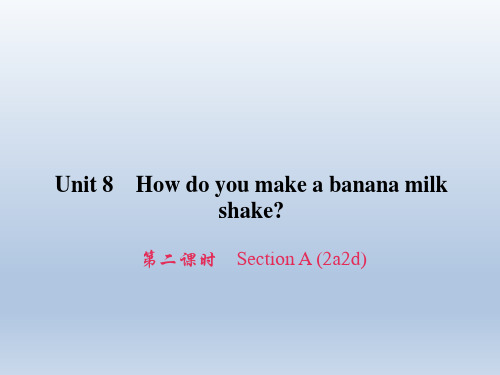
Unit 8 How do you make a banana milk shake?
第二课时 Section A (2a-2d)
►【辨析】how many与how much ①how many是对可数名词的数量提问,后接可数名词复数。 ②how much是对不可数名词的数量提问,后接不可数名词,另外还可 对物品的价格提问。 ►one cup of...意为“一杯……”,是不可数名词数量的表达方式。若要 表达量的复数概念,把计量词变成复数即可。 eg:two spoons of salt两勺食盐 ►First...Next...Then...Finally...这几个副词常用于表示做事情的先后顺序, 意为“首先……其次……然后……最后……”。
一、根据句意及图片提示完成单词。
1 题图)
2 题图)
3 题图)
4 题图)
5 题图)
1.When summer comes,_w__a_te_r_m_e_l_o_n_(_s)_will become very popular. 2.I want to go to the supermarket to buy some ___y_o_g_u_r_t__. 3.Would you please buy some __h_o_n_e_y___for me? 4.There are two ___s_p_o_o_n_s__on the table. 5.My mother put too much __s_a_lt___ into the chicken soup.
三、按要求完成下列句子。 12.—__H_o_w___do you make a sandwich?(根据答语完成句子) —I don't know,please ask mom.She can make it. 13.Please pour some milk into the glass.(改为否定句) Please _d_o_n_'_t p_o_u__r a_n_y__ milk into the glass. 14.Tim ate three bananas yesterday.(对画线部分提问) _H__o_w_ m__a_n_y____bananas did Tim eat yesterday? 15.We need one_cup_of_yogurt.(对画线部分提问) ____H_o_w_ _m_u_c_h__ yogurt do you need?
Unit13-Section2-SavetheSharks!拯救鲨鱼
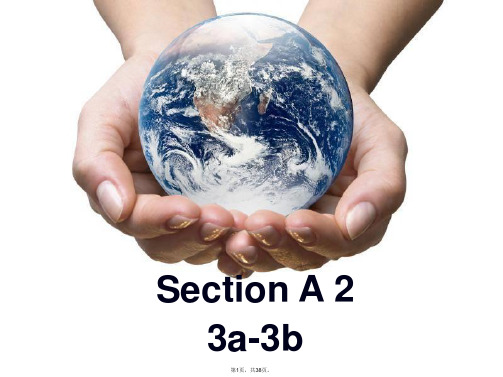
numbers of some kinds of sharks have fallen by over
90 percent in the last 20 to 30 year…s.的数量
在过去的20到30年里 与现在完成时连用
第19页,共38页。
Environmental protection groups around the world, such as WildAid and the WWF, are teaching the public about “fin例n如ing”. They have even asked governments to
ocean life. Many believe that sharks can never be
endangered because they are the strongest in their
food
chain.
But
in
fact,
濒临灭绝的
around 70
million
sharks
are
caught and traded in this食in物d链ustry every year. T实h际e上
love animals is to love ourselves.
第6页,共38页。
Use some words to describe the sharks
第7页,共38页。
big
large
cruel
scaring
terrible
第8页,共38页。
dangerous
Sharks are at the top of the food chain in the ocean’s ecosystem.
Unit2sectionA单词及课文知识点2023-2024学年人教版七年级英语上册

七年级Unit 2 Section A单词及课文知识点一、重点单词:1.sister n.姐;妹 a sister two sister s两个姐妹2.mother n.母亲;妈妈This is my mother. 这是我的妈妈。
3. father n. 父亲;爸爸That is my father. 那是我的爸爸。
4. parent n.父(母)亲5. brother n. 兄;弟a brother two brothers两个兄弟6. grandmother n.(外)祖母;奶奶;外婆;姥姥7. grandfather n.(外)祖父;爷爷;外公;姥爷8. grandparent n.祖父(母);外祖父(母)9. family n. 家;家庭10. those pron. 那些11. who pron. 谁;什么人12. these pron.这些13. they pron. 他(她、它)们(they的单数形式he/she/it)14. well interj.嗯;好吧;adv.好地(learn English well学好英语);adj.健康的(Iam well.我很健康。
)15. have v.经受;经历;有16. day n. 一天;一日;白天17. bye interj(=goodbye)再见18. parent: father or mother 父亲或母亲19. parent s: father and mother父亲和母亲二、介绍人物:1. 介绍单个人物:This / That is...这/那位是......例句:This is my friend Jane.这(位)是我的朋友简That is my grandfather. 那(位)是我的祖父。
(注意:英语中在打时,表达“我是......”应用“This is...”;询问对方是谁,应用“Is that...?你是...... /Who is that?你是谁?”)2. 介绍多个人物:These / Those are...这/那些是......These are my brothers. 这些是我的兄弟。
人教版go for it九年级英语 Unit2 Section A 1 (1a – 2d) 教案
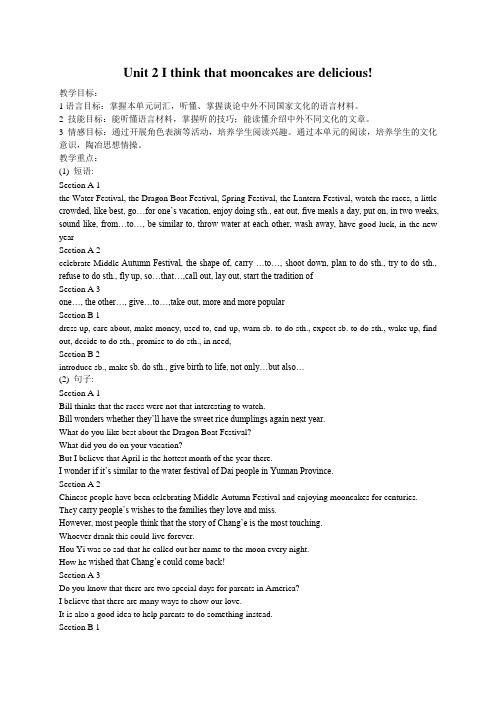
Unit 2 I think that mooncakes are delicious!教学目标:1语言目标:掌握本单元词汇,听懂、掌握谈论中外不同国家文化的语言材料。
2 技能目标:能听懂语言材料,掌握听的技巧;能读懂介绍中外不同文化的文章。
3 情感目标:通过开展角色表演等活动,培养学生阅读兴趣。
通过本单元的阅读,培养学生的文化意识,陶冶思想情操。
教学重点:(1) 短语:Section A 1the Water Festival, the Dragon Boat Festival, Spring Festival, the Lantern Festival, watch the races, a little crowded, like best, go…for one’s vacation, enjoy doing sth., eat out, five meals a day, put on, in two weeks, sound like, from…to…, be similar to, throw water at each other, wash away, ha ve good luck, in the new yearSection A 2celebrate Middle-Autumn Festival, the shape of, carry …to…, shoot down, plan to do sth., try to do sth., refuse to do sth., fly up, so…that…,call out, lay out, start the tradition ofSection A 3one…, the other…, give…to…,take out, more and more popularSection B 1dress up, care about, make money, used to, end up, warn sb. to do sth., expect sb. to do sth., wake up, find out, decide to do sth., promise to do sth., in need,Section B 2introduce sb., make sb. do sth., give birth to life, not only…but also…(2) 句子:Section A 1Bill thinks that the races were not that interesting to watch.Bill wonders whether they’ll have the sweet rice dumplings again next year.What do you like best about the Dragon Boat Festival?What did you do on your vacation?But I believe that April is the hottest month of the year there.I wonder if it’s similar to the water festival of Dai people in Yunnan Province.Section A 2Chinese people have been celebrating Middle-Autumn Festival and enjoying mooncakes for centuries.The y carry people’s wishes to the families they love and miss.However, most people think that the story of Chang’e is the most touching.Whoever drank this could live forever.Hou Yi was so sad that he called out her name to the moon every night.How he wished that Chang’e could come back!Section A 3Do you know that there are two special days for parents in America?I believe that there are many ways to show our love.It is also a good idea to help parents to do something instead.Section B 1Many would agree that when we think of Christmas, we probably think of gifts, Christmas trees and Santa Claus.A Christmas Carol is a famous novel written by Charles Dickens.He just cares about whether he can make more money.Marley used to be just like Scrooge, so he was punished after he died.He now treats everyone with kindness and warmth, spreading love and joy everywhere he goes.Section B 2Not only do people spread them around in different hiding places for an egg hunt, but they also give out these treats as gifts.教学难点:1. 学会运用宾语从句来表达句子。
Unit 12 Section A 第2课时示范公开课教学PPT课件【英语人教新目标七下】

Warming-up Presentation
Practice Production Summary
Make sentences with who or what. In these questions, who/what is the subject or the object.
1. Somebody broke the window. Who broke the window?
Warming-up Presentation
Practice Production Summary
Read about Lisa’s journey to Madrid aloud and answer the questions.
1. Where did Lisa go last weekend? She went to Madrid.
sentences of the simple past tense.
form of the verb.
Warming-up Presentation
Practice Production Summary
Look and fill
1 — Who _d_i_d_ Sally __se_e_? — She saw Bob.
great evening.
Warming-up Presentation
Practice Production Summary
Read and circle
1. — When / How did Sally meet Bob? — At 9 o’clock.
2. — Who / Where did Sally go? — She went to London.
- 1、下载文档前请自行甄别文档内容的完整性,平台不提供额外的编辑、内容补充、找答案等附加服务。
- 2、"仅部分预览"的文档,不可在线预览部分如存在完整性等问题,可反馈申请退款(可完整预览的文档不适用该条件!)。
- 3、如文档侵犯您的权益,请联系客服反馈,我们会尽快为您处理(人工客服工作时间:9:00-18:30)。
1. 看句子末尾的标点,可知这五个句子都 是问句。 2. 先在所给的词汇中找特殊疑问词或助动 词等。 3. 判断该句是一般疑问句还是特殊疑问句。 4. 特殊疑问句:特殊疑问词 + 助动词 + 动 词(词组) + 其他? 5. 一般疑问句: 助动词 + 动词(词组) + 其他?
1. How do you get to school? 2. How long does it take to get to school? 3. How far is it from your home to school? 4. Do you walk to school?
It’s about five kilometers.
Do you walk to school, Grace?
Yes, I do.
Do you take a bus to school, Tom?
No, I don’t. I goes to school by bike every day.
How do you get to school, Cindy?
—你从家到学校多远? —仅有大约两公里。 —How far is it from your home to school? —It’s only about two kilometers. —简走路上学吗? —不,她不是。她骑车自行车。 —Does Jane walk to school? —No, she doesn’t. She goes by bike.
S2 lives about … S3 lives about …
1. drive to + 地点 开车去某地 e.g. Does your uncle drive home? 你叔叔开车回家吗? 2. get, go 等词后面跟地点名词时要用介 词to。 get to school 去学校 go to the library 去图书馆
a. Yes, they do. b. No, he doesn’t. c. He rides his bike. d. It’s five kilometers. e. About 15 minutes.
1. 特殊疑问句, 对出行方式提问, 故用c作答。 2. 特殊疑问句, 对时间提问, 故用e作答。 3. 特殊疑问句, 对距离提问, 故用d作答。 4. 一般疑问句, 主语为第三人称复数, 故用a 作答。 5. 一般疑问句, 主语为第三人称单数, 故用b 作答。
5. 对两地间的距离提问下列句型: _______ How far + is it _____ from 某地 ___ to 某地? 如: 从他家到服装店多远? _______ __ the clothes from his home to How far is it _____ store? 从北京到上海有多远? _______ How far is __ it from Beijing ___ to Shanghai?
4. 如果对时间段提问的话,就用 How long + does it take sb. to do sth.? _________ 句型。 e.g. How long does it take to walk to school?
How long does it take to do her homework?
—他们上学坐公交吗? —不,他们不。他们走路。 —Do they take the bus to school? —No, they don’t. They walk.
get to 某地 ? 1. How do/does + 某人 + ___________ 某人怎么去某地? how是疑问副词, 本句中用来提问 出行方式 等。 __________ 如: 你叔叔通常怎样去香港? How does your uncle get to Hong Kong? ___________________________________
Ask your classmates questions and write 3c their names in the chart. The first student to fill in all the blanks wins!
How far is it from your home to school?
8. How far is it from … to …? 从……到……多远? 9. How long does it take…? ……需要多长时间? 10. It takes sb. some time to do sth. 花某人多长时间做某事
Translate the conversation. —你如何上学? —我骑自行车。 —How do you get to school? —I ride my bike.
3b Use the words to make questions.
1. school/you/get to/do/how ___________________________? 2. to/school/get to/does/how long/take/it ___________________________? 3. school/your/ from/it/is/how far/ home/to ___________________________? 4. you/to/walk/do/school ___________________________? 5. ride/their bikes/do/school/your friends/to ___________________________?
—她如何上学? —她通常坐公交车。 —How does she get to school? —She usually takes the bus. —上学需要花费多少时间? —大约15分钟。 —How long does it take to get to school? —It takes about 15 minutes.
1. ride a bike = by bike 骑自行车 2. take the subway = by subway 乘坐地铁 3. take the train = by train 乘坐火车 4. take a plane = by plane 乘坐飞机 5. take the bus = by bus 乘坐公车 6. walks = on foot 走路、步行 7. get to 到达
It takes about ten minutes.
Find someone who … lives about five kilometers from school. walks to school.
takes a bus to school. goes to school by bike. needs about an hour to get to school. need about 10 minutes to get to school.
当他们后面跟 home, here 等副词时,
不用 to。
e.g. How does your bro交通工具 + to 某地。 A: 某人 + take(s) + ____________ B: 某人 + get(s) to 某地 + _____________ 如: 我叔叔乘飞机去香港。 by 交通工具 ___________________________________ My uncle takes the plane to Hong Kong. ___________________________________ My uncle gets to Hong Kong by plane.
Name
Make a survey in your group.
Questions How far do you live from school? Do you walk to school?
S1
5 kilometers No, I don’t.
How do you get to school? take the bus How long does it take to get to school? 10 minutes
3. it takes sb. some time to do sth. 意为:___________________________ 某事花费某人……时间 如: 步行大约要花我15 分钟的时间。 _________________________________ It takes me about 15 minutes to walk. 做作业大约花费简30分钟的时间。 _________________________________ It takes Jane 30 minutes to do her _________________________________ homework.
Make a report about your classmates. In my group, S1 lives about five kilometers from school. He goes to school by bus. It takes about ten minutes to get to school.
I ride my bike to school.
How long does it take to get to school, Mary?
It takes about an hour to get to school.
How long does it take to get to school, Jane?
5. Do your friends ride their bikes to school?
